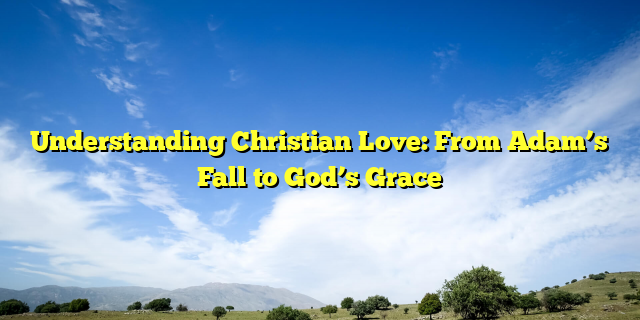Christian love is a complex and profound concept, often misunderstood in today’s world. Why are we flawed? Why do we fall short? Why can’t we just “get it right”? The answer lies within the core teachings of Christianity, specifically within the contrasting figures of Adam and Jesus, and the overarching theme of God’s grace.
Pastor James Merritt shares insights on Christian love and grace.
The Sinful Infection from Adam
The Apostle Paul, in Romans 5, explains our inherent brokenness. He states that we are all “sinfully infected” by Adam. Just as sin entered the world through one man, Adam, and death through sin, so death came to all people because all sinned. The world is rife with evidence of this – from everyday errors and misjudgments to the more profound displays of sin that dominate our news cycles.
We are not sinners because we sin; we sin because we are sinners. We are born with a predisposition to sin, a spiritual inheritance from Adam’s disobedience. This concept was once a foundational teaching in early American education, epitomized by the first line of the “New England Primer”: “In Adam’s fall, we sinned all.” This underscores the inherited nature of sin, a spiritual virus passed down through generations.
The Absence of Law Does Not Remove Sin
Paul addresses the question of those who lived before Moses and the giving of the law. How could they be held accountable without a specific set of rules? He clarifies that while the presence of law reveals sin, its absence does not negate it. Everyone died between Adam and Moses, not because they broke a specific commandment, but because they carried within them the seed of Adam’s original transgression. Death, both physical and spiritual separation from God, is the ultimate consequence.
The Spiritual Correction Through Jesus
The despair of our inherited sinfulness is met with the hope of redemption through Jesus Christ. Paul emphasizes that what Adam has done to us, Jesus has undone for us. Adam’s sin brought guilt, Jesus’ death brought grace. Adam’s sin ruined us, Jesus’s death redeemed us. Adam’s sin condemned us to eternal death, Jesus’s death offers eternal life.
This is not merely a one-to-one exchange. Jesus’ sacrifice goes beyond simply canceling out Adam’s sin. It elevates us to a position of reigning in life through Christ. We are not merely freed from the shackles of sin; we are made heirs of God’s kingdom.
The Supremacy of Grace
The mechanism of this transformation is grace. God’s grace is not simply mercy, a pardon for our transgressions. It is an overflowing, superabundant provision that empowers us to reign in life through righteousness. Where sin flows, grace overflows. Where sin reigns, grace floods.
The law, given by God, was not meant to show us how to be righteous through our own efforts. Rather, it was meant to reveal the depth of our sinfulness, highlighting our need for a savior. It is not through adherence to the law that we overcome our “born loser” status, but through the transformative power of God’s grace.
Where Are You?
The question remains: where are you? Are you in Adam or in Christ? We are all born in Adam, under the law, destined to lose. But through faith in Jesus Christ, we can be born again, placed under grace, and empowered to reign in life.
Conclusion: From Born Losers to Born Again Winners
We are all born losers in Adam, inheriting a sinful nature and destined for death. But through the grace of Jesus Christ, we can be born again, spiritually corrected, and empowered to reign in life. This is the essence of Christian love – a love that transcends our flaws and failures and offers us the gift of eternal life. Embrace the transformative power of God’s grace and experience the fullness of life in Christ.
